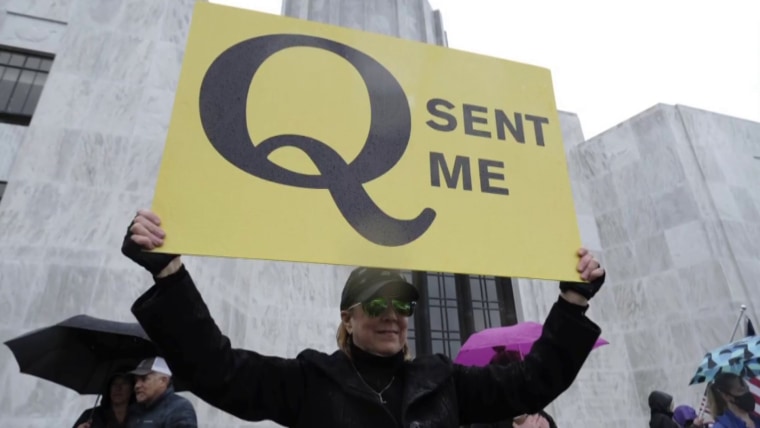QAnon fanatics are rebranding their ‘secret war.’ And it could work.
A few years into waiting for “the storm” to sweep away former President Donald Trump’s enemies, some believers in the prophetic QAnon conspiracy theory have decided to take matters into their own hands.
These “digital soldiers” aren’t picking up guns or marching on the Capitol — though many actually did that. Instead, nearly 100 Q-aligned candidates ran for Congress in the 2020 election, according to watchdog site Media Matters for America, with dozens of others running for governor, state legislature seats and county offices. Some were hardcore Q evangelists, while others had merely retweeted a QAnon hashtag. But all had shown some deference for a violent prophecy cult that was turning conspiracy theories into gospel.
These “digital soldiers” aren’t picking up guns or marching on the Capitol — though many actually did that.
Like so many of QAnon’s predictions, these candidates mostly failed. The majority didn’t get past their primary or ran in solidly Democratic districts and had no chance of victory. A few won at the state level, and constant media fixture Marjorie Taylor Greene, who has spouted QAnon-friendly conspiracy theories for years, won her deeply Republican congressional district in Georgia. But she was an outlier.
Post-2020, Q believers are once again gearing up to run for office and grow their movement, but with two major strategy changes. One is that Q believers are now getting involved in local elections for school boards and city councils and showing up at board meetings to scream about Q-linked topics. The other is that many of these candidates no longer identify as believers in QAnon — or even acknowledge that a movement with that name ever existed. They’re taking their “secret war” to new recruits looking to strike back against a way of life they feel is eroding — without the public acknowledgement that such a war exists. In doing so, they have the potential to expose new audiences to their violent mythology, without having to explain away the baggage that comes with the term “QAnon.”
Both changes come straight from the top: one from several Q “drops” on the message board 8kun and the other from QAnon hero Michael Flynn. (Flynn trademarked the term “digital soldiers,” which is what many Q believers see themselves as.)
In a September post, “Q” ordered believers to “drop all references re: ‘Q’ ‘Qanon’ etc.” to avoid being banned on social media. A month later, Q declared that “there is Q, there are anons, there is no QAnon.” Q posited that the very term “QAnon” was a media creation with no real meaning. It wasn’t true, but it didn’t matter. The term was no longer necessary, because Q’s mythology of an all-powerful deep state that enables child trafficking and election fraud was entering the mainstream conservative discourse.
More recently, in June, Flynn ordered believers at a “Reopen/Reawaken America” event to “not allow school boards to dictate what is happening in our schools.” Flynn has also had the quote “local action equals national impact” attributed to him, though only based on a meme on a popular QAnon message board. But again, whether he used that quote or not doesn’t matter here — only the feeling of doing something important matters. Flynn himself has been relentlessly promoting and raising money off QAnon — while simultaneously distancing himself from it.
Spurred on by their leaders, real and imagined, Q believers are showing up at school board gatherings and running for obscure local offices around the country.
Spurred on by their leaders, real and imagined, Q believers are showing up at school board gatherings and running for obscure local offices around the country. They’re spouting the same conspiracy theories about sex traffickers, critical race theory and the erasure of conservatives represented by “cancel culture” that have long been at the heart of QAnon. They’re scaring parents while firing up disaffected conservatives. And they’re doing both without publicly associating with or name-dropping Q. Either way, the message is the same: There’s a war going on against your way of life, and the only way to win is if you personally join the fight.
That model, of attempting to gain power at the local level using QAnon mythology while simultaneously discarding the QAnon brand itself, is a sustainable path forward for a movement that had seemed to be teetering on the brink of irrelevance. It forges a new, durable way to actually influence policy without relying on cryptic nonsense found on an extremist message board. And it fits in perfectly with the GOP’s emphasis on pushing culture war issues at the expense of actual governing.
The new Q doesn’t rely on the goodwill of social media giants but on small meetings and text message blasts that stoke fears of conservative culture war bogeymen. It’s putting aside the impossible hope of Donald Trump being “reinstated” as president and focusing on winning real local elections with real impact.
That impact is real. In June, the National Education Association released an op-ed asking “Is QAnon Radicalizing Your School Board?” highlighting board election wins by Q believers in Michigan, Washington, Florida and California. And that was before the more organized attempts to infiltrate school boards with fears of trafficking and critical race theory.
The rebranded Q and its leaders are taking their cues from the Christian right and the tea party, making national issues a Main Street problem. Most people don’t think, as QAnon posits, that Hillary Clinton is a child-trafficking occultist — but many more live in terror of their kids being brainwashed or kidnapped, a fear that Q gurus already exploited in the 2020 “Save the Children” hysteria. Few Republicans think Trump will be “restored” to office, but virtually all believe their way of life is being “canceled” by liberalism’s godless onslaught.
QAnon evangelists — whether identifying with QAnon or not — are taking their “plan” straight to local schools. This time, they’re far less likely to fail.



